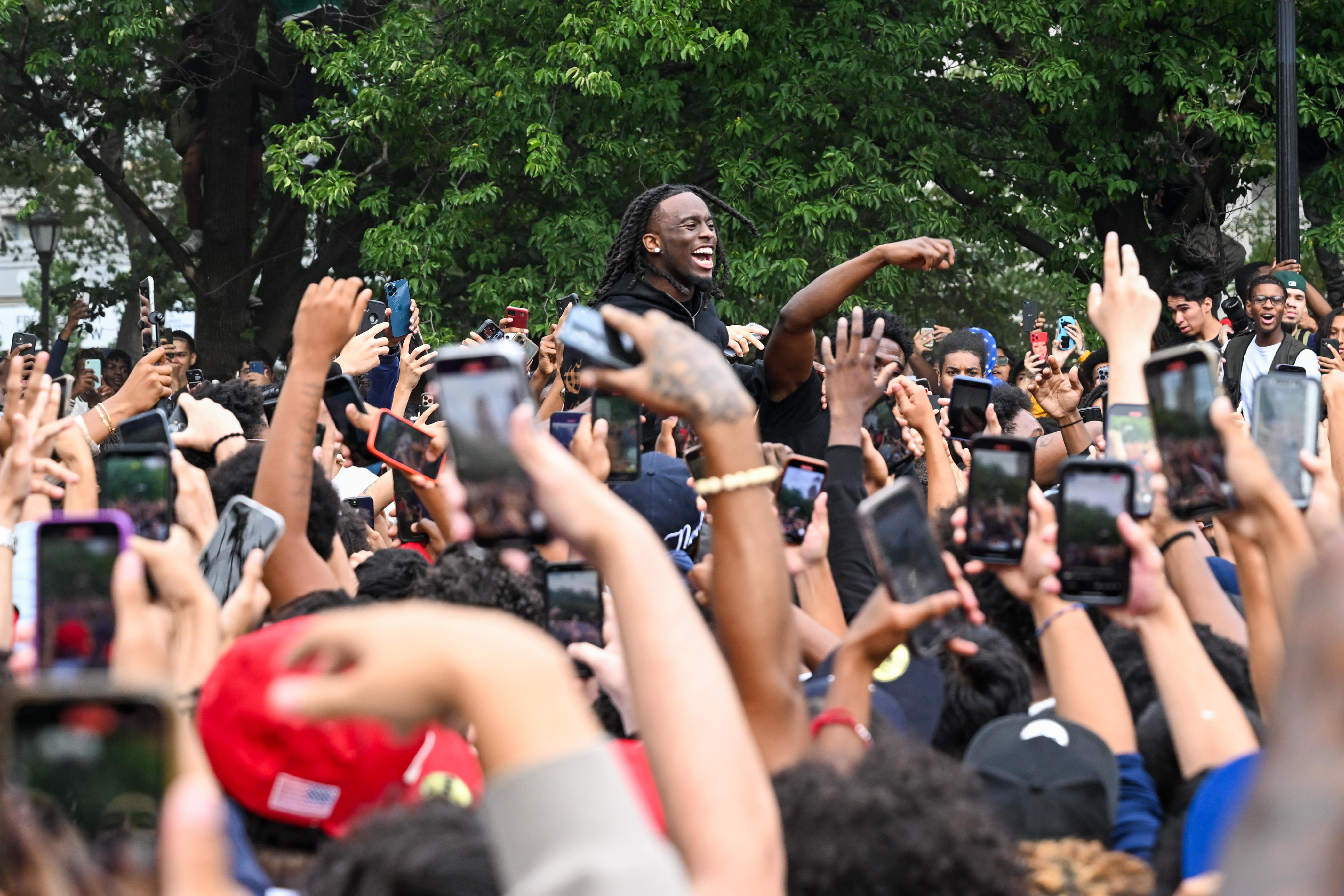The dubious power of celebrity influencers
Are influencers responsible for the behavior of fans online or IRL?


A free daily email with the biggest news stories of the day – and the best features from TheWeek.com
You are now subscribed
Your newsletter sign-up was successful
One of Twitch's most popular streamers, Kai Cenat, faces charges related to inciting a riot after a legion of his young fans took over New York City's Union Square. Cenat was there for a giveaway, but when thousands of teens swarmed the area, the impromptu meet and greet "descended into chaos," The New York Times reported. The massive meet-up "exemplified the power of niche internet celebrity" while demonstrating "what can take place when the energy of an online fan base bursts into the non-virtual world."
Cenat has 6.5 million followers on Twitch and broke the record for most paying subscribers on the platform earlier this year. He invited his followers to meet him in his hometown for a giveaway of PlayStation 5s and streaming equipment. Some of the mostly teen crowd turned rowdy, and the police arrested dozens of people.
The internet and social media have redefined what it means to be famous. Influencer culture thrives on how much power these internet celebs hold over their fanbases — It's literally a part of their job description. The real-life consequences of that power aren't always positive, particularly when the fanbase is made up of impressionable teens. When that power is weaponized or materializes into real-life chaos, how much responsibility should fall on internet celebrities? And why are they so powerful in the first place?
The Week
Escape your echo chamber. Get the facts behind the news, plus analysis from multiple perspectives.

Sign up for The Week's Free Newsletters
From our morning news briefing to a weekly Good News Newsletter, get the best of The Week delivered directly to your inbox.
From our morning news briefing to a weekly Good News Newsletter, get the best of The Week delivered directly to your inbox.
Influencers inspire powerful parasocial relationships
Influencers often emerge from obscurity and build fanbases by inviting them into their worlds. Unlike traditional celebrities, they are often people who never intended to command widespread attention from the general public. By putting their lives on display, they inspire some followers to build connections with them that "feel so strong and so personal that they'll start to develop what is sometimes called a parasocial relationship," Megan Moreno, an adolescent medicine physician, and researcher at the University of Wisconsin School of Medicine and Public Health told NPR.
Because these stars seem so accessible, fans will engage with the creators believing "they're actually reciprocating the relationship, even though they're not really at that personal level that they think they are." Content creators are responsible for realizing "that they're not choosing to put themselves out there as a distant celebrity," Moreno explained. They should remember that "they're engaging with people and building relationships and expectations."
The interactive nature of Twitch encourages fans to think of streamers as friends, Mark Johnson, a digital culture lecturer at the University of Sydney, told Wired. Fans can interact with their favorite streamers live, giving the "feeling like you're the one being talked to like you're the one being invited, you're the one being asked to hang out with this famous influencer," Johnson added. "With someone who is purely a celebrity and the distance that implies, I think this event plays out differently in most cases."
Influencers aren't necessarily trained to handle fame
Moreno also pointed out to NPR that many influencers and internet celebs "are not that far outside the adolescent and young adult age range" and face the challenge of "navigating their own expectations about those relationships and what they mean." For years people have lamented what fame does to young people in Hollywood, and now we're seeing that today with young influencers. They become overnight sensations and are left "struggling to figure out how to be famous, how to nurture these relationships, and how to grow up, too."
A free daily email with the biggest news stories of the day – and the best features from TheWeek.com
"Within this business, a lot of the creators, they grow really fast," Keith Dorsey, chief executive of Atlanta-based social media management company Young Guns Entertainment told the Times. "And they don't know really know what type of influence they have until something like that happens." He added that in the future, Cenat's management team should coordinate with the proper authorities.
On the other hand, in response to another creator's apology video, Youtuber WillyMacShow, argued that creators are only responsible for their audience if they "directly tell them to do something." If the creator has thousands of followers, "statistically speaking one of them is going to be unhinged." Ninja, another popular Twitch streamer, countered that while creators aren't responsible for their fans, they do "have a responsibility to be a good role model and leader, especially when you are talking about sensitive topics."
Theara Coleman has worked as a staff writer at The Week since September 2022. She frequently writes about technology, education, literature and general news. She was previously a contributing writer and assistant editor at Honeysuckle Magazine, where she covered racial politics and cannabis industry news.
